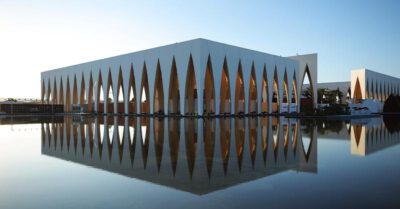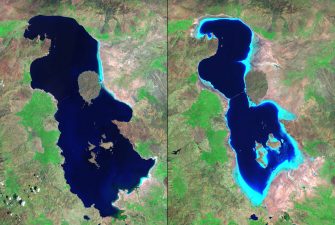 Egypt topped the world Environmental Performance Index for the Middle East and North Africa region, followed closely by Israel
Egypt topped the world Environmental Performance Index for the Middle East and North Africa region, followed closely by Israel
Every two years, Yale University in collaboration with Columbia University release the world Environmental Performance Index which ranks most countries environmental performance. This year, Egypt topped the list for the MENA region, followed closely by Israel and the United Arab Emirates. In the wider context, however, the region is still trailing far behind with Egypt making it only to the ‘modest performers’ list. Egypt was ranked the 60th most environmental country with an EPI score of 55.18 – Switzerland which topped the chart scored 76.69.
The 2012 world EPI ranked 132 countries on 22 performance indicators including air pollution, water resources, forestry, fisheries, climate change and biodiversity. As well as tracking the environmental record of countries, the EPI list tracks who made the most significant gains in a ‘trends list’.
For example, Egypt made it to the top five in the trends list due to substantial gains made in the environmental health objective. This includes dealing with indoor air pollution, improving access to drinking water and sanitation. Saudi Arabia and Kuwait scored very low on the trends list.
Some of the worst performed in the MENA region included Iraq which scored an EPI of 25.32 due to the water scarcity facing the country, significant sustainability challenges and weak governance structures.
Modest Performers List
- Egypt [EPI score 55.18]
- Israel [54. 64]
- UAE [50.91]
- Saudi Arabia [49.97]
Weaker Performers List
- Algeria [48.56]
- Lebanon [47.35]
- Tunisia [46.66]
- Qatar [46.58
- Sudan [46.00]
- Morocco [45.76]
- Oman [44.00]
- Syria [42.75]
- Iran [42.73]
- Jordan [42.16]
Weakest Performers List
- Libya [37.68]
- Kuwait [35.54]
- Yemen [35.49]
- Iraq [25.32]
Although not included in the MENA region list, Turkey scored 44.8 which places it between Morocco and Oman in the Weaker performers list. To provide a pinch of salt to their research, Yale and Colombia acknowledge that there are significant data gaps in their index. These include nuclear safety, wetlands loss, species loss, freshwater ecosystems health, recycling, desertification and municipal and toxic waste management. For a county by country breakdown of the data go to the EPI website.
: Information and data via EPI 2012.
: Image via Creap/flickr.
For more data-led information on the Middle East’s Environment see:
Water and the Middle East (At A Glance)
The Middle East’s Carbon Emissions (Infographic)




Lol @ the UAE and Saudi Arabia being green countries. They are among the largest carbon producers in the world, and their dirt-cheap gasoline and increasingly energy intensive industries (such as aluminum smelting) are making it even more so. Dubai is hardly a model of environmental friendliness. If they could talk, the fish and reefs that were displaced by the contruction of the Jumierah Palm island might also tell you otherwise. Their constuction projects are extravagant and show no concern for the ecosystem at all, regardless of how much greenwashing they may do by talking about solar energy. Saudi Arabia has disallowed foreign tourism, which has had the effect of preventing beach development along its Red Sea coast, leaving them in a pristine state. So it scores points there. But it is incredibly inefficient and extravagant in so many other ways.
The Aswan Dam has not helped the once-rich Nile Valley eco-system one bit. The entire Nile Delta region is literally crumbling into the sea because of the lack of silt. And the incessant unregulated construction of mega beach resorts along the Red Sea coast has completely destroyed most of the reefs along the northern Red Sea coast, and threatens to do the same in the south, now that Marsa Alam has an airport and people are fleeing the denuded northern coast.
Israel has done quite a bit of damage, but it has managed what resources it has quite wisely. And it has reforested many areas and chosen plants that use modest amounts of water (i.e. oranges, dates, and avocados), while Egypt and Saudi Arabia have chosen water guzzlers like sugarcane and wheat.
Thank you for highlighting the good news in MENA’s list. It would be wonderful if this friendly international eco-competition got as much attention as the world cup and the Olympics. Keep up the great writing!
It’s amazing to hear that Egyptians are learning to see Egypt at theirs again!! Even in the small ways.
Thanks for your insightful comment- what you say about people being happy to see ownership but not stewardship is sadly very true everywhere you go. People expect clean streets but they don’t seem to realise that it’s up to them to stop littering…
Arwa
I can’t remember the name of the Egyptian novelist or the book he wrote about the transition of last spring, but something he wrote struck a chord with me. He dropped a cigarette or piece of rubbish and an old woman ran up to him and told him to pick it up. He was shocked but again she scolded him to pick it up. She told him that if we’re going to have a new Egypt, it should be a clean Egypt.
Despite politics which suggest that people care deeply about land ownership, too often people don’t take ownership of their environment. Here in Ireland 90 years after independence, many people seem to treat the outdoors as if it still belongs to a wealthy British landlord. So Dublin, a city of 1 million has more litter on its streets than Cairo, a metropolis of 7 million. Even in the U.S. more than 200 years after independence, generations after Woody Guthrie’s, “This Land is Your Land”– some people still don’t understand that ownership implies stewardship.